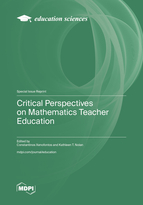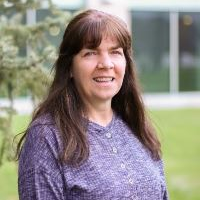Critical Perspectives on Mathematics Teacher Education
A special issue of Education Sciences (ISSN 2227-7102). This special issue belongs to the section "Teacher Education".
Deadline for manuscript submissions: closed (30 September 2023) | Viewed by 21884
Special Issue Editors
Interests: mathematics teacher education; sociocultural and sociopolitical issues; knowledge; beliefs; practices
Interests: mathematics teacher education; culturally responsive pedagogy; ethnomathematics; disruptive pedagogy
Special Issue Information
Dear Colleagues,
The purpose of this Special Issue is to provide a platform for scholars working in mathematics teacher education to discuss critical perspectives on this area. By mathematics teacher education, we refer to both initial teacher education (prospective teachers) and continuous professional development (practicing teachers) at all school levels (early years, primary, secondary). Further, we use the term critical as an umbrella under which different philosophical/epistemological approaches intersect, aiming at supporting prospective/practicing teachers toward developing socio-cultural and/or socio-political awareness about mathematics, its teaching/learning, and the world beyond formal schooling. In the past, colleagues have explored these issues in mathematics education through the theoretical lenses of equity, social justice, culturally responsive pedagogy, Indigenous education, ethnomathematics, critical mathematics education, and so on. In this Special Issue, we focus these lenses specifically on the field of mathematics teacher education. By referring to critical perspectives, we invite scholars to submit empirical or theoretical papers aimed at disrupting the status quo of teacher education and empowering teachers to develop awareness of the social, cultural, and political dimensions of mathematics education. In doing so, we challenge colleagues to reconsider notions, such as positive dispositions, necessary content knowledge for teaching, and effective teaching skills, areas of focus that persist in technical–rational approaches to teacher education.
Potential topics include, but are not limited to:
- Working with prospective and/or practicing mathematics teachers and issues of minoritization: e.g., gender and gender identity, ethnicity, social class, disability, sexual orientation.
- Reporting on programmes about the engagement of prospective and/or practicing mathematics teachers with concepts, such as equity, social justice, critical mathematics education, Indigenous education, culturally responsive pedagogy, ethnomathematics, and so on.
- School-based approaches involving mathematics teachers in addressing the learning needs of children with diverse backgrounds.
- Theory practice dilemmas in aiming for critical perspectives in/for mathematics teacher education.
- Essays, systematic reviews, meta-synthesis, or meta-analysis papers addressing critical issues in mathematics teacher education.
Dr. Constantinos Xenofontos
Prof. Dr. Kathleen T. Nolan
Guest Editors
Manuscript Submission Information
Manuscripts should be submitted online at www.mdpi.com by registering and logging in to this website. Once you are registered, click here to go to the submission form. Manuscripts can be submitted until the deadline. All submissions that pass pre-check are peer-reviewed. Accepted papers will be published continuously in the journal (as soon as accepted) and will be listed together on the special issue website. Research articles, review articles as well as short communications are invited. For planned papers, a title and short abstract (about 100 words) can be sent to the Editorial Office for announcement on this website.
Submitted manuscripts should not have been published previously, nor be under consideration for publication elsewhere (except conference proceedings papers). All manuscripts are thoroughly refereed through a double-blind peer-review process. A guide for authors and other relevant information for submission of manuscripts is available on the Instructions for Authors page. Education Sciences is an international peer-reviewed open access monthly journal published by MDPI.
Please visit the Instructions for Authors page before submitting a manuscript. The Article Processing Charge (APC) for publication in this open access journal is 1800 CHF (Swiss Francs). Submitted papers should be well formatted and use good English. Authors may use MDPI's English editing service prior to publication or during author revisions.
Keywords
- critical perspectives
- mathematics teacher education
- equity
- social justice
- ethnomathematics
- critical mathematics education
- Indigenous education
- culturally responsive pedagogy
- socio-cultural issues
- socio-political issues







